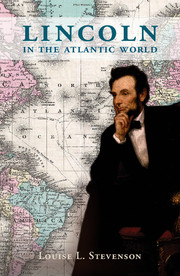Book contents
- Frontmatter
- Dedication
- Contents
- Acknowledgments
- Introduction: My Lincoln Lessons
- 1 The Second Shot Heard ’Round the World
- 2 African Lessons
- 3 European Lessons
- 4 German Lessons
- 5 English Lessons
- 6 Lessons from International Law
- 7 German Lessons for Reelection
- 8 The Last Lesson
- Notes
- Selected Bibliography
- Index
8 - The Last Lesson
Published online by Cambridge University Press: 05 November 2015
- Frontmatter
- Dedication
- Contents
- Acknowledgments
- Introduction: My Lincoln Lessons
- 1 The Second Shot Heard ’Round the World
- 2 African Lessons
- 3 European Lessons
- 4 German Lessons
- 5 English Lessons
- 6 Lessons from International Law
- 7 German Lessons for Reelection
- 8 The Last Lesson
- Notes
- Selected Bibliography
- Index
Summary
On the morning of April 14, 1865, the fifth day of Passover in the Jewish calendar and Good Friday in the Christian one, residents of the city of Washington prepared for a final day of celebration after the tumult of the past two weeks. On April 2, General Lee's Army of Northern Virginia had evacuated the CSA capital of Richmond, Virginia. Seven days later, the general surrendered his forces to Ulysses S. Grant at Appomattox Court House, Virginia. The consequences of the surrender began almost immediately. On April 11, President Lincoln issued an executive order lifting the naval blockade that had closed ports in the Confederacy to the rest of the world. Two days later, the War Department announced that it would cease drafting and recruiting soldiers into the federal military. With combat winding down and the curtailment of the purchase of war matériel, the Department predicted that it would save a million dollars a day.
By the end of the week, celebrations with fireworks, bands, and cheering crowds had erupted across the northern cities, even in Baltimore, which had resisted the transit of Union soldiers through its streets in April 1861. As a former quartermaster of the Union forces remembered those days, “From Maine to California we belted the continent with bonfires, and rivaled the stars with the blaze of our rockets. Probably never again in this country will such scenes be witnessed; certainly never before in this hemisphere has there been such a saturnalia of rejoicing.” If people had not lived through the Civil War years, he expected, they would find incomprehensible “the hight [sic] and depth and breadth of joy which welled up from the heart of the nation.”
In the nation's capital, the federal government celebrated after dark on Tuesday, April 11. Along streets illuminated with candles burning in the windows of its office buildings, crowds marched with flaming torches to the brightly lit Executive Mansion to hear the president speak. Light from the candle-filled windows extended an aura over the surrounding multitude and mansion grounds.
- Type
- Chapter
- Information
- Lincoln in the Atlantic World , pp. 210 - 226Publisher: Cambridge University PressPrint publication year: 2015

